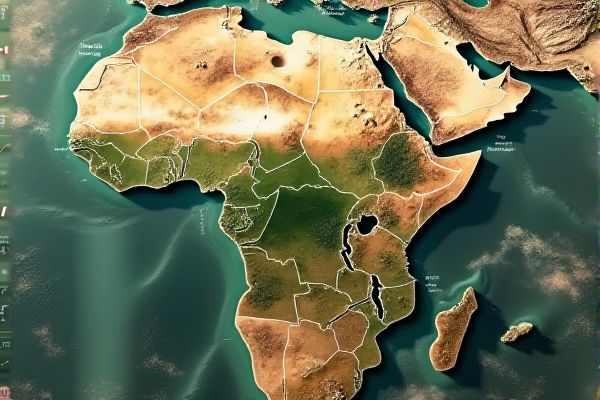
Ethiopia's rapid development and emphasis on infrastructure, agriculture, and environmental management have led to increased demand for GIS and Remote Sensing professionals. Various sectors such as urban planning, natural resource management, and disaster response are actively seeking individuals skilled in geographic information systems and remote sensing technologies. Organizations, including governmental bodies, NGOs, and private companies, offer roles ranging from data analysis and mapping to project management and research. Pursuing relevant certifications and honing technical skills in software such as ArcGIS and QGIS can enhance job prospects in this evolving field.
Job Description
GIS and remote sensing jobs in Ethiopia involve analyzing geographic data and utilizing technology to support various sectors, including agriculture, urban planning, and environmental management. Positions often require proficiency in software such as ArcGIS and QGIS, alongside skills in data interpretation and spatial analysis. Roles may vary from field data collection to data modeling, requiring both technical expertise and an understanding of local geographic challenges. Employers generally seek candidates with a degree in geography, environmental science, or a related field, with hands-on experience in data visualization and remote sensing techniques being highly advantageous.
Requirement
GIS and remote sensing jobs in Ethiopia often require a strong educational background in geography, environmental science, or a related field. Proficiency in GIS software such as ArcGIS or QGIS is essential, along with experience in remote sensing technologies. Employers may look for skills in data analysis, cartography, and the ability to interpret satellite imagery. Previous work experience or internships in spatial analysis projects can enhance your profile and increase job prospects in this rapidly growing sector.
Salary and Perks Expected
GIS and remote sensing jobs in Ethiopia offer competitive salaries that vary based on experience, qualifications, and the specific organization. Entry-level positions typically start around $500 to $1,000 per month, while experienced professionals can earn between $1,500 and $3,000 monthly. Job perks often include health insurance, transportation allowances, and opportunities for professional development, reflecting the growing importance of geographic data in sectors such as agriculture, urban planning, and environmental management. As demand for skilled professionals continues to rise, pursuing a career in this field can provide you with a meaningful and rewarding experience.
Similar Job Names
- Geospatial Analyst
- Remote Sensing Specialist
- GIS Technician
- Cartographer
- GIS Developer
- Surveying Engineer
- Environmental Analyst
- Geodata Scientist
- Remote Sensing Analyst
- Urban Planning Analyst
- Land Use Planner
- Geographic Information Systems Manager
- Cartography Technician
- Data Visualization Specialist
- Geospatial Software Engineer
- Climate Change Analyst
- Natural Resource Manager
- Infrastructure Planning Specialist
- Remote Sensing Scientist
- Transportation Planner
Job Expectation Concept
GIS and remote sensing jobs in Ethiopia are becoming increasingly relevant due to the country's emphasis on sustainable development and resource management. Professionals in this field are expected to utilize geographic data to address challenges in agriculture, urban planning, and environmental monitoring. Familiarity with software tools such as ArcGIS and QGIS is essential, along with strong analytical skills to interpret complex datasets. Your ability to adapt to local contexts and collaborate with various stakeholders will significantly enhance your contributions to projects aimed at improving infrastructure and natural resource management in Ethiopia.
Career Advantage and Weakness
GIS and remote sensing jobs in Ethiopia offer significant career advantages, particularly due to the country's ongoing investment in infrastructure and urban planning. The demand for skilled professionals in these fields is growing as organizations increasingly rely on data-driven decision-making. However, challenges such as limited access to advanced technology and the need for specialized training can impede career growth. You may find that enhancing your skills through relevant courses can help you overcome these barriers and improve your job prospects in this evolving sector.
Important Thing Must Know
GIS and remote sensing jobs in Ethiopia are rapidly growing due to the country's emphasis on sustainable development and resource management. Organizations, including government bodies and NGOs, are increasingly utilizing geographic information systems for land use planning, environmental monitoring, and disaster management. Your skills in data analysis and software applications can set you apart in a competitive job market that values innovative solutions to local challenges. Networking with professionals in the field, attending workshops, and participating in relevant training can enhance your opportunities in this sector. Understanding Ethiopia's unique geographic and cultural context can significantly boost your employability and effectiveness in GIS and remote sensing roles.
Alternative Career Options
GIS and remote sensing professionals in Ethiopia can explore various alternative career paths beyond traditional roles. Positions in environmental consultancy allow you to work on projects that assess land use, biodiversity, and climate change impacts. Opportunities in urban planning involve the integration of geospatial data to enhance infrastructure development and service delivery. Additionally, jobs in agriculture focus on precision farming and resource management, utilizing remote sensing to optimize crop yields and sustainability practices.
Companies List
- Ethiopian Mapping Agency
- Ethiopian Satellite Communications Authority
- Ministry of Urban Development and Construction
- Ethiopian Agricultural Research Institute
- Ethiopian Geological Survey
- Development and Research Associates
- Zemen Bank
- World Bank Ethiopia Office
- UNDP Ethiopia
- African Union Peace and Security Department
- Ethiopian National Disaster Risk Management Commission
- Ethiopian Railway Corporation
List of Ideal City
Ethiopia offers several cities that are ideal for GIS and remote sensing careers. Addis Ababa, the capital, is a hub for technology and innovation, featuring numerous research institutions and organizations focusing on spatial data analysis. Bahir Dar, known for its academic institutions, provides opportunities in environmental monitoring and resource management. Finally, Mekelle has seen growth in technology sectors that utilize GIS for developmental projects, making it a promising location for your career in this field.
 jobs-ethiopia.com
jobs-ethiopia.com